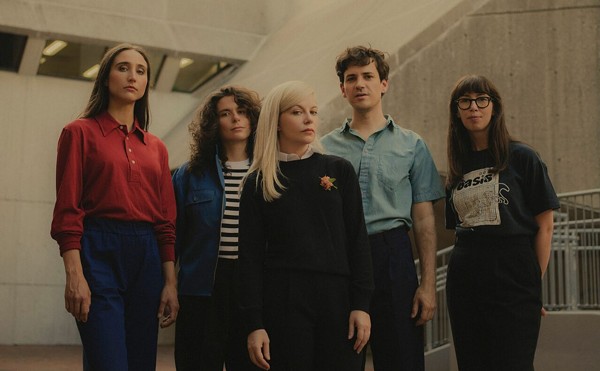For more than two decades, singer-songwriter Sam Phillips has crafted a spectacular body of sophisticated, shadowy pop albums. Although progressively modern, her work is populated with time-warp ghosts of Tin Pan Alley and Revolver-era Beatles. Phillips has also created original soundtracks for the entire run of the Gilmore Girls TV show, and her song "Sister Rosetta Goes Before Us" has recently been prominently covered by Robert Plant and Alison Krauss. Still, Phillips tends to travel a bit under the mainstream's radar, and her 2004 A Boot and a Shoe album stands as one of this decade's most criminally overlooked recorded masterpieces.
With any luck, her follow-up, Don't Do Anything, will get the acclaim it deserves. The album deals with spiritual and relational themes through some rather dreamlike and cryptic imagery. Don't Do Anything's title track can be taken at face value as a description of unconditional love and grace. However, you've got to wonder whether listeners might interpret it as a sinister satire of some creepy, manipulative power play, translating "I love you when you don't do anything" to mean "Shut up and stay out of my way and I'll love you."
"It's funny - a couple of people at one of my recent shows came up and asked just that," she explains in a recent phone interview. "They really wanted to know, 'Were you being sarcastic or did you really mean that?' which I thought was interesting. I absolutely do mean it, but it's a little bit broader in the sense of not [being] just a love song. I was thinking of my ex-husband T Bone [Burnett], who is always so generous in what he tries to do for everyone - my little girl and, really, all the 'Type A' people that I know: mothers, teachers, people who are just tirelessly doing things for other people. And it's about the whole mentality of our culture, how you've got to be a success and that it's not who you are but what you do and what you've accomplished."
Although the lyrics to "Don't Do Anything" may be fairly forthright, Phillips acknowledges some subtle, ironic satire in naming the album after the song.
"Especially in a year when we have such a big, intense election coming up and a lot of issues that do need changing and there's a lot to do, I couldn't resist naming the record Don't Do Anything," she says. With 1989's The Indescribable Wow and 1994's Martinis & Bikinis, Phillips has often recontextualized 1960s pop, but her more recent albums feel more rooted in popular music of the 1930s or '40s.
"I guess it's just reflective of my formative years," she explains. "I was very young, but my older brother was listening to the Beatles and Led Zeppelin and all the '60s stuff, so I was hearing some of that. Then there was a time when I was a little older, 10 or 11, where I was listening to nothing but my parents' 78s. For a year or two, I decided I wasn't going to listen to any [contemporary] pop music, which is really kind of a weird thing for a 10- or 11-year-old, when you think about it. But that's just what I was interested in. But I guess all that did sink in, and I do love all those eras."
Phillips notes that Sister Rosetta Tharpe, the 1940s musician described on "Sister Rosetta Goes Before Us," is probably less significant as a direct musical inspiration and, as Phillips says, "more of a metaphor in that song for strength and independence."
"The I Ching talks about how, when situations arise and you're having conflicts or things are really difficult, sometimes you have to be willing to go on alone," she says. "When you see video of her on YouTube, this woman is in high heels and a dress, playing this crazy guitar and just rocking out. To have her in the context of the 1940s, she was on popular radio and was a gospel singer too; she was just a funny maverick, very odd for her time."
In addition to music, Phillips has a particular fondness for both 1940s Art Deco and 1960s Modernist clothing styles and design. Coincidentally, in the past couple of years, for her own amusement, Phillips has been dabbling in some decidedly retro visual art that ended up playing a significant role in both the aural and visual content of her new album. "I was experimenting with collages, and some of that artwork went into the album packaging," she says. "Putting together a lot of Madison Avenue slogans and images from the '50s and '60s, I came up with some song titles - or at least places to start writing songs like 'Little Plastic Life' and 'My Career in Chemistry.'"
Phillips connects another recent trend in her current creative process to a sense of liberation from the strange expectations and business of the music industry.
"Going back to where the song 'Don't Do Anything' really comes from, I don't feel like I have to prove myself so much [anymore], that I can be a little simpler when it comes to writing or production," she says. "As far back as maybe [1990's] Cruel Inventions, [producer] T Bone Burnett and I were really hell-bent on trying to do interesting things, delving into a lot of crazy sounds. And even Martinis & Bikinis was very layered and produced. With that one and Omnipop after that, both of us just became exhausted with record production. Fan Dance, the first record I did for Nonesuch, was really fun because … we stripped everything away to get at the songs and the performances. I found that a lot more rewarding. I feel like Fan Dance and A Boot and a Shoe and now this record have been stripping things away and slowly adding things back in, but with a different intent. Again, I don't feel the need to have to show anybody that I can produce or make a record, because I think that's beside the point. I think the point is to move people and draw them into the song. If the production isn't doing that, then it's useless."
Phillips' discography boasts contributions from luminaries like Elvis Costello, Marc Ribot and members of XTC and R.E.M. As a result, she now finds herself writing music to further explore songs in spontaneous collaboration with the top-notch writers she knows will accompany her later in the studio.
"I feel I'm in a great place where I'm able to work with these wonderful musicians, and that's what makes me write more songs," says Phillips. "That's the unfortunate addiction that I have, [that] if it weren't for these musicians, I could probably go on and do something else. And really, at the end of the day, playing live is why I'm doing it. It's certainly not about selling records anymore, it's not about making money - but it's about making music with these musicians that I love. And that's it."











